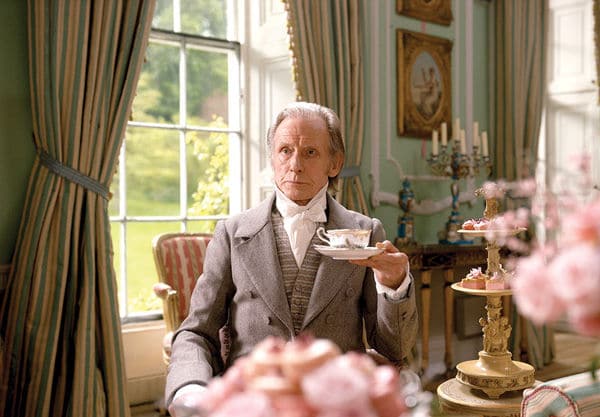I am one of those admirers of Jane Austen who has read her books multiple times and seen all the various film and TV versions made from them. I have no problem with each new adaptation bringing its own “modern spin” to the stories and was thoroughly entranced by the version of “Emma” that became Amy Heckerling’s “Clueless.” The 2020 “Emma” in theaters now is very pretty, with a color palette that is nearly blinding in its brightness, gorgeous costumes, breathtaking country estates and landscapes that make you yearn to hop the next plane for the English countryside. Oh, and Bill Nighy plays Emma’s father, Mr. Woodhouse; the actor, with one twitch of an eyebrow, brings a smile of appreciation no matter what he does. That being said, I found the film not particularly interesting. Yes, much of the novel’s dialogue is faithfully reproduced but so often overplayed for sitcom-like laughs, that it feels like everyone is simply trying too hard. I can’t help thinking how much more I liked the 1996 version starring Gwyneth Paltrow, and even Alicia Silverstone in “Clueless” was endearing.
Emma herself is a difficult character to like—she is spoiled, entitled, controlling and self-centered, except when it comes to caring for her father, a man both obsessed with his health and greatly dependent on his daughter’s company. Both Paltrow and Silverstone made us like Emma, despite her drawbacks; the current Emma, Anya Taylor-Joy, does not. It’s a big problem when you don’t care for the heroine of an Austen novel or film and, in this case, all of Emma’s character faults are highlighted; her assets are nearly invisible. On the other hand, the actress who plays Emma’s friend, the lower class Harriet Smith (Mia Goth), pretty much steals the film with her sweet, goofy charm. Johnny Flynn is simply too young to be taken seriously as Mr. Knightly and he comes across as petulant rather than mature and reasonable—the counterpoint to Emma’s immaturity. This “Emma” is all froth; if you like froth, by all means avail yourself of it.
Michael Cristofer has quite an impressive resume: award-winning playwright, screenwriter, theater and film director, producer, and actor. “The Night Clerk,” written and directed by Cristofer, is an interesting film, if not an entirely successful one. There are many thought-provoking elements—the hero is a young man “on the spectrum” (Tye Sheridan) who in his job as a night clerk at a hotel secretly films its rooms’ occupants, not for voyeuristic reasons but so that he can learn how “normal” people talk and act. This leads him to witness what seems to be a murder. The mysterious woman at the center of the story befriends him; she is played by Ana de Armas (from last year’s “Knives Out”) and her portrayal of a highly sensual, sad, street-savvy woman caught up in an obsessive relationship is hard to forget. But, plot-wise, there is a coincidence that sets the whole thing in motion and it’s too hard to accept. Not only that; the film lacks rising tension—there are too many lulls in the action to keep the suspense going. Finally, everything is wrapped up too neatly in the end. Cristofer’s script is uneven but his direction, while a bit show-off-ish, is professional and crisp.
I began watching a sci-fi, parallel-universe thriller, “Counterpart,” over this past weekend and I admit to getting hooked. The two seasons are both available on Amazon Prime Video and are worth watching (so far, at least, as I’m halfway through the first season) for the quirky premise and Academy Award-winner J. K. Simmons. Here, he plays two versions of the main character, one a straight-arrow, the other a swaggering rule-breaker. The fun begins when each is called on to impersonate the other. Simmons and dark sci-fi; it it’s your kind of thing—as it is mine—by all means go for it.


